In this edition:
* BuzzSat Satellite Meteorology Course Now Available
* AMSAT Volunteers Power Hamvention Exhibit
* The 16th Annual TAPR/AMSAT Banquet Enjoyed by Many
* AMSAT Symposium
* March/April 2025 AMSAT Journal Now Available
* JAMSAT Symposium
* Changes to AMSAT-NA TLE Distribution
* Change to Upcoming Satellite Operations
* ARISS News
* AMSAT Ambassador Activities
* Satellite Shorts From All Over
The AMSAT News Service bulletins are a free, weekly news and information service of AMSAT, the Radio Amateur Satellite Corporation. ANS publishes news related to Amateur Radio in Space including reports on the activities of a worldwide group of Amateur Radio operators who share an active interest in designing, building, launching and communicating through analog and digital Amateur Radio satellites.
The news feed on http://www.amsat.org publishes news of Amateur Radio in Space as soon as our volunteers can post it.
Please send any amateur satellite news or reports to: ans-editor [at] amsat.org
Sign up for free e-mail delivery of the AMSAT News Service Bulletins via the ANS List; to join this list see: https://mailman.amsat.org/postorius/lists/ans.amsat.org/
BuzzSat Satellite Meteorology Course Now Available
The AMSAT Youth Initiative is pleased to introduce the first in its series of “Satellites in Space Help Us Live a Better Life on Earth” online courses!
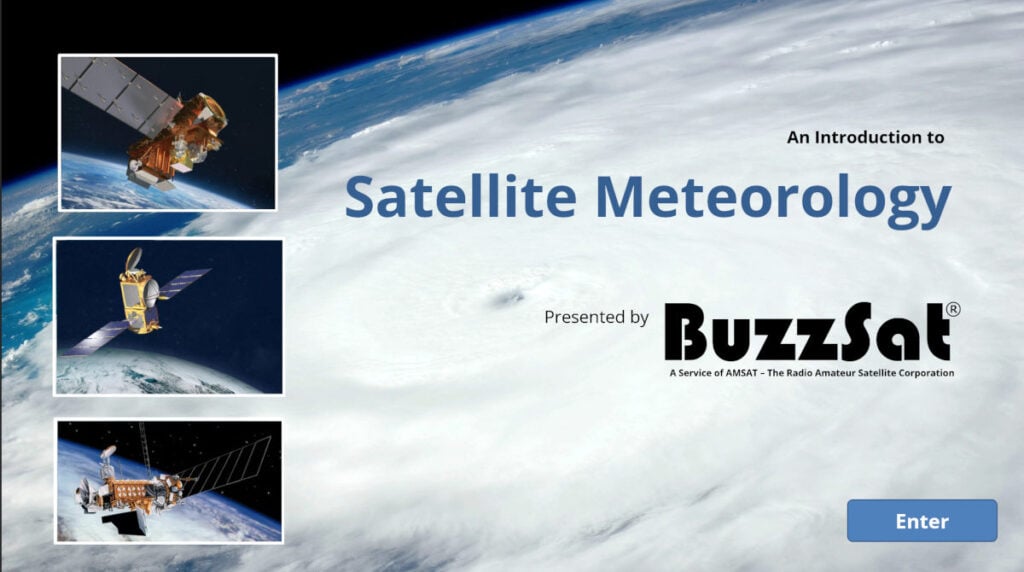
Title screen from the Satellite Meteorology online course (Image: AMSAT)
An “Introduction to Satellite Meteorology” explores the many ways that NOAA satellites help meteorologists predict the immediate weather and long-term climate behavior to make our lives more enjoyable and safer. It is designed for students Grades 8-12.
Each chapter has 40-50 pages and is expected to take perhaps 30 minutes per chapter. If you leave the course, it will remember where you left off so you won’t have to start from scratch.
The course is designed to be “self-standing” so any student, parent, youth leader or teacher can independently utilize the course. The courses are free. You can try this course at:
Please note that this edition of the course is a beta release. Numerous improvements to the navigation features, clarity of graphics and technical content are scheduled for the next release in June 2025. But we’d love to hear from you! Please send your comments and suggestions to Frank Karnauskas, AMSAT VP-Development at f.karnauskas [at] amsat [dot] org.
Future course to be added later this year include how satellites play a critical role in managing:
- Climate Change
- Pollution Control
- Wildlife and Natural Resources
- Navigation
- Satellite Design and Operation
- Space Exploration
- Communications
- Broadcasting
- Military Operations
- And much, much more!
Subject matter experts in any of these areas or educators in the sciences are invited to talk with the BuzzSat team about future course development.
[ANS thanks AMSAT for the above information.]
AMSAT Volunteers Power Hamvention Exhibit
AMSAT volunteers kept busy at the organization’s exhibit at the 2025 Dayton Hamvention. Interest level was high among both satellite veterans and hams just wanting information on how to get started on the satellites.
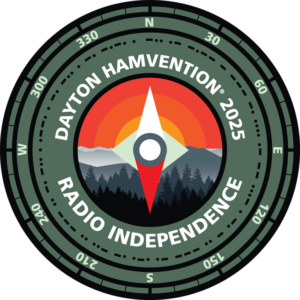
The hot seller at the exhibit was the brand new, updated edition of the book, Getting Started in Amateur Satellites.
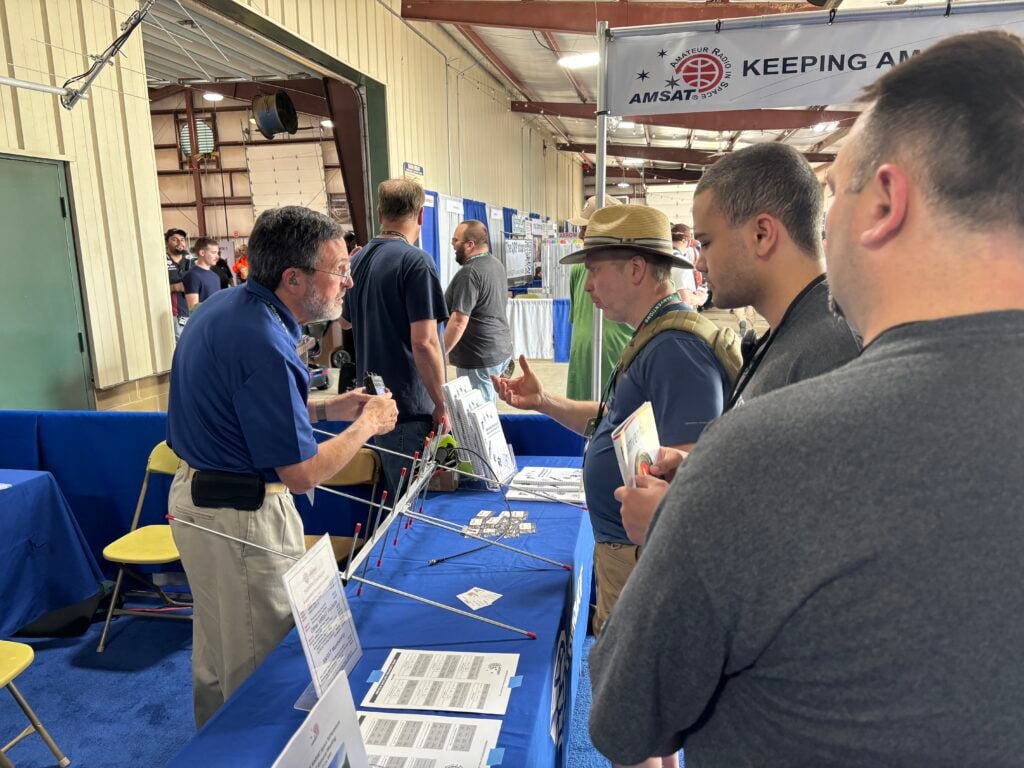
Steve Belter, N9IP, AMSAT Treasurer, helps beginners (Photo: Mark Johns)
The AMSAT Education area attracted the attention of a number of young hams and soon to be hams. Carsten Glasbrenner, KQ4SJM, son of AMSAT VP-Operations, Drew Glasbrenner, KO4MA, shared his knowledge with other young people who came to the exhibit.
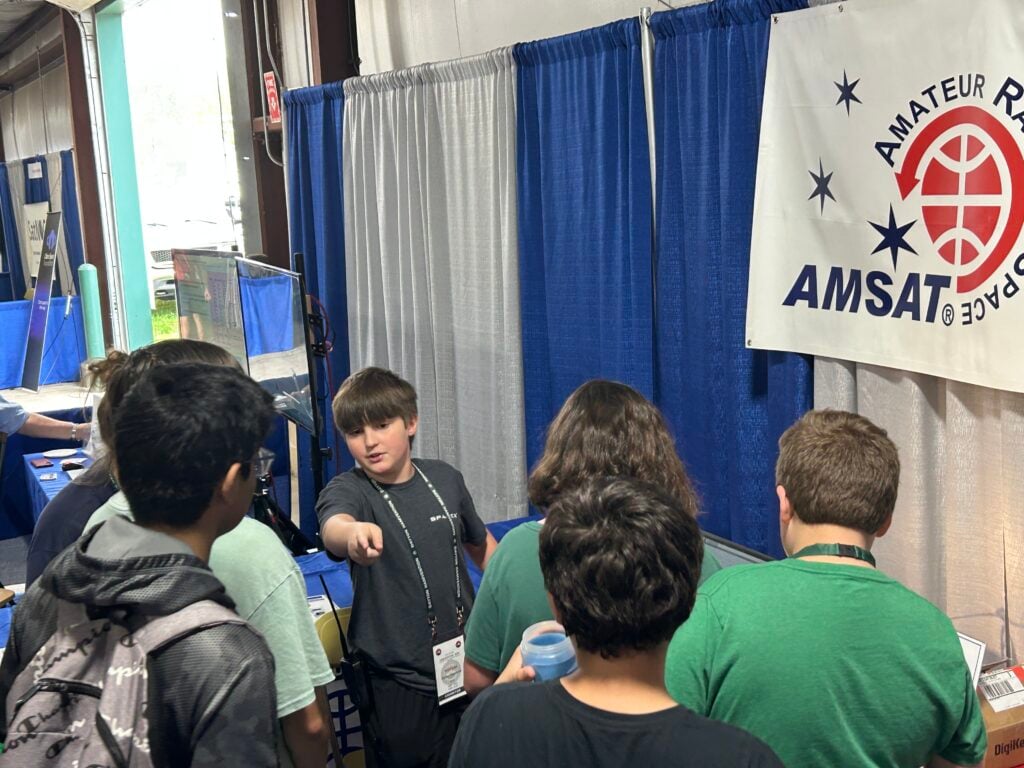
Carsten Glasbrenner, KQ4SJM, points out Cubsat SIM displays to youth. (Photo: Drew Glasbrenner)
Interest was also high at the AMSAT engineering area, where members of the engineering team discussed the GOLF-Tee and Fox-Plus satellites currently under construction.
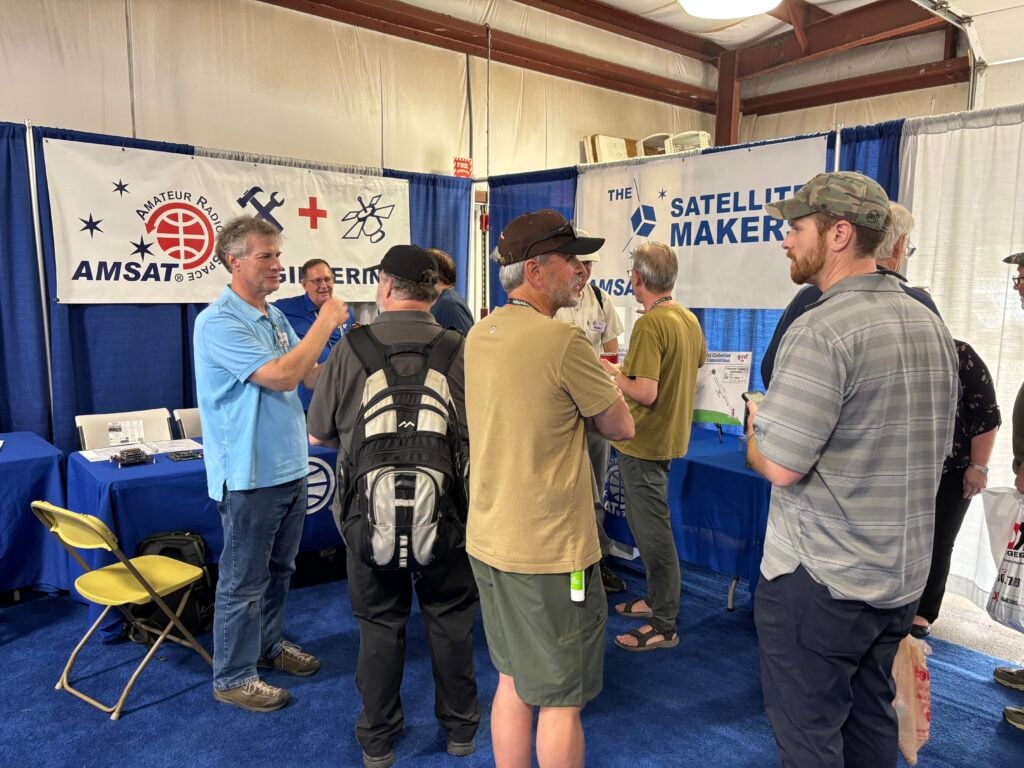
AMSAT VP-Engineering, Jerry Buxton, NØJY, and other engineers discuss satellite construction with Hamvention participants (Photo: Mark Johns)
Live satellite demonstrations outside of the exhibit area also drew interest from Hamvention participants.
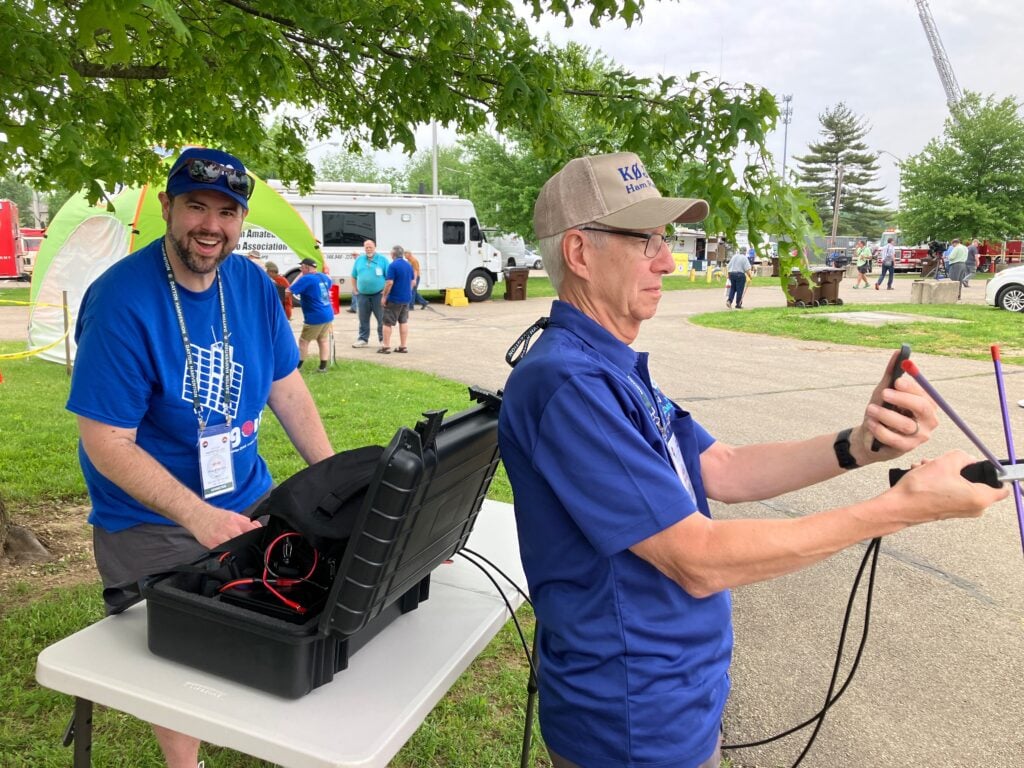
AMSAT Executive VP, Paul Stoetzer, N8HM, operates on RS-44 as Mark Johns, KØJM, aims the Arrow antenna. (Photo: Keith Baker)
The Hamvention AMSAT Forum was held on Saturday afternoon, May 17. The forum featured updates on the organization itself from AMSAT President Robert Bankston, KE4AL, Executive VP Paul Stoetzer, N8HM, and from Frank Karnauskas, N1UW, VP-Development. Frank also updated those in attendance on the AMSAT Youth Initiative, including the “Satellites in Space Help Us Live a Better Life on Earth” online courses (see above).
Jerry Buxton, NØJY, VP-Engineering, provided an overview of upcoming satellite projects and launches in development and Drew Glasbrenner, KO4MA, VP-Operations, discussed efforts to extend the lives of satellites already on orbit.
Prior to the beginning of the Hamvention, on Thursday evening, May 15, AMSAT members and friends gathered at Ticket’s Pub & Eatery in nearby Fairborn, Ohio for what has become a traditional gathering in recent years. More than 40 were in attendance — a record number for this event.
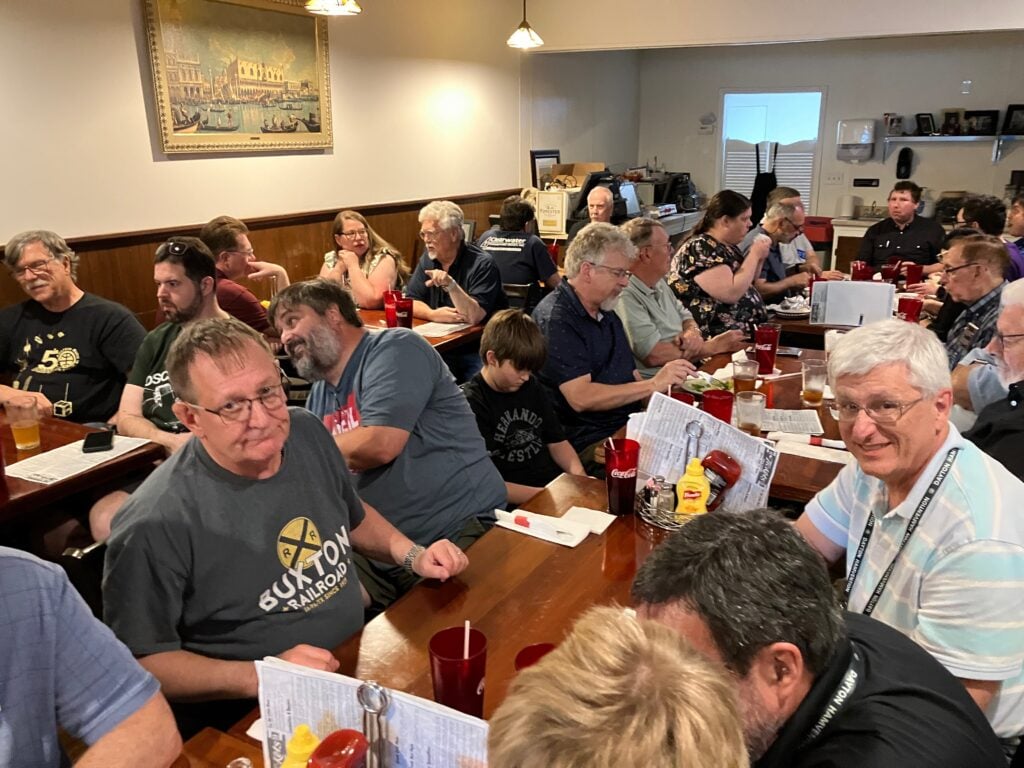
AMSAT members enjoy a pre-Hamvention meal at Ticket’s on Thursday (Photo: Keith Baker)
[ANS thanks AMSAT for the above information]
The 2025 AMSAT President’s Club Coins Are Now Available!
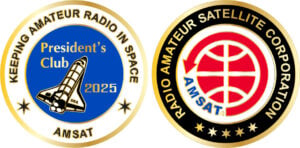
Celebrating the 40th Anniversary of Amateur Radio on Human Spaceflight
Help Support GOLF and Fox Plus.
Join the AMSAT President’s Club today and help
Keep Amateur Radio in Space!
https://www.amsat.org/join-the-amsat-presidents-club/
The 16th Annual TAPR/AMSAT Banquet Enjoyed by Many
The 16th annual TAPR/AMSAT Banquet was held at the Kohler Presidential Banquet Center on Friday, May 16. This dinner is always a highlight of the TAPR (Tucson Amateur Packet Radio) and AMSAT (Radio Amateur Satellite Corp.) activities during the Dayton Hamvention. This year’s banquet speaker was Phil Karn, KA9Q, who highlighted developments and use cases for his ka9q-radio software suite for SDR receivers.
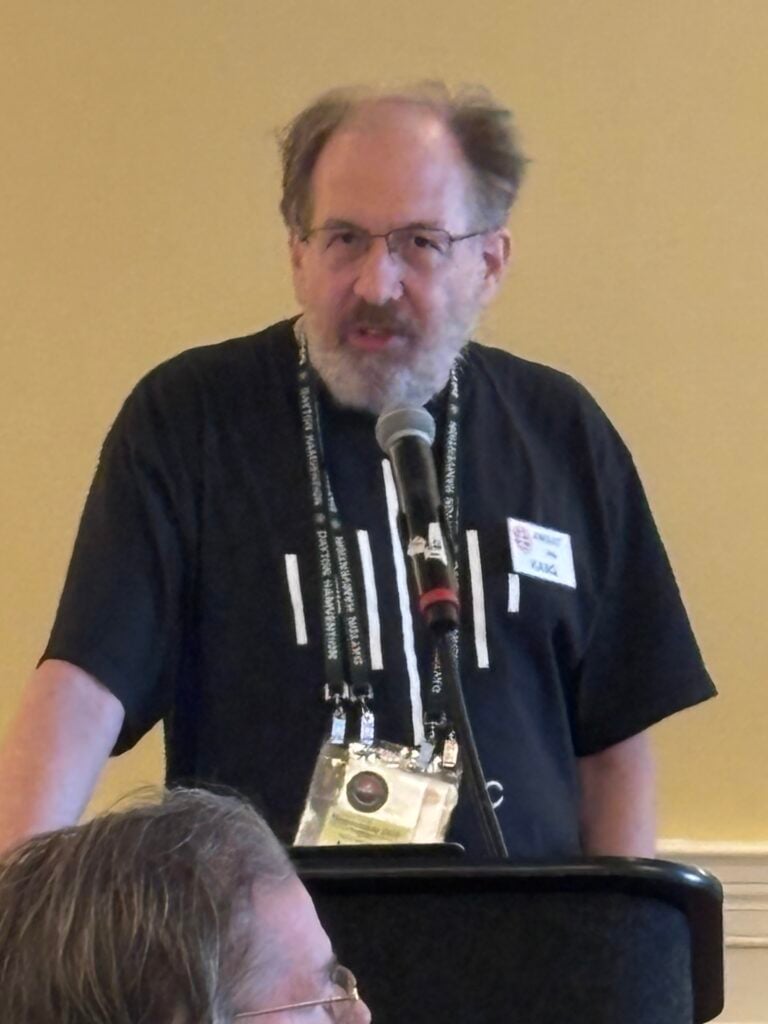
Phil Karn delivers the TAPR/AMSAT banquet address (Photo: Mark Johns)
Karn was the recipient of the ARRL’s Mary Hobart, K1MMH, Medal of Distinction. He was presented the honor at the ARRL donor reception on May 15, 2025, at the National Museum of the United States Air Force on Wright-Patterson Air Force Base near Dayton, Ohio.
A graduate of Cornell University and Carnegie Mellon University with degrees in Electrical and Computer Engineering, Karn has retired from a technology career including Bell Labs, Bellcore, and Qualcomm. He is co-founder of AMPRnet, is founder and past-President of Amateur Radio Digital Communications (ARDC), a private foundation that exists to support amateur radio and digital communication science and technology through grants and scholarships, and the management of 44Net. Karn continues to serve on the ARDC Board of Directors. The work of ARDC has contributed approximately $30 million to amateur radio since 2020.
Karn has been licensed since he was 15. “It’s been a major factor in my life, directly and indirectly,” he said. Karn views amateur radio as a creative outlet. “I’m an engineer, so I need an outlet for my technical ideas. I’m retired, so amateur radio now fulfills that need. It’s very gratifying to see others using your ideas and works,” said Karn.
Karn’s technical contributions to advance the Amateur Radio Service drive his dedication to the future of education through ham radio. He envisions education having a greater role in amateur radio in decades to come. “Ham radio has always excelled at individual self-learning, but it could do so much more. I’d really like to see the many technical tinkerers outside ham radio join us. I’d like to see much more amateur radio in formal education. HamSCI and the many university small satellite groups are good examples but there could be so much more. Hams will continue to create new technology, usually by working in academia and industry but also as individuals,” he said.
Mary Hobart, K1MMH, was ARRL’s first Chief Development Officer. She passed away in 2021. The medal named in her honor is given to those individuals or couples who have inspired our small community to reach higher with their own philanthropic support of ARRL and amateur radio. In 2023, ARRL honored Michael “Mike” D. Valentine, W8MM (Silent Key), and his wife Margaret “Peg” Valentine with the inaugural Hobart Medal.
[ANS thanks ARRL for the above information]
43rd Annual AMSAT Space Symposium & Annual General Meeting Announced
Save the date! The 43rd Annual AMSAT Space Symposium & Annual General Meeting will be held October 16th through Sunday October 19th. The site of the 2025 event will be the Holiday Inn & Suites Phoenix Airport North.

(Photo credit: Holiday Inn & Suites Phoenix Airport North)
The hotel is located minutes away from Phoenix Sky Harbor airport and features free airport shuttle, all-suite rooms at affordable prices and free breakfast! Information for room reservation at reduced rates and event registration will be published shortly.
For your planning purposes, the overall schedule for the event is as follows:
Thursday, October 16th
0900 – 1700 Board of Directors Meeting
Friday, October 17th
0900 – 1200 Board of Directors Meeting
1300 – 1700 Symposium Presentations
1800 – 2100 Reception & Auction
Saturday, October 18th
0900 – 1200 Symposium Presentations
1300 – 1500 Symposium Presentations
1500 – 1700 Annual General Meeting
1800 – 1900 Reception
1900 – 2100 Banquet
Sunday, October 19th
0800 – 1000 Members Breakfast
(Times subject to change.)
Plan to attend this fun and informative event while you exchange ideas with your friends in the world of amateur satellites!
[ANS thanks AMSAT for the above information.]
Need new satellite antennas?
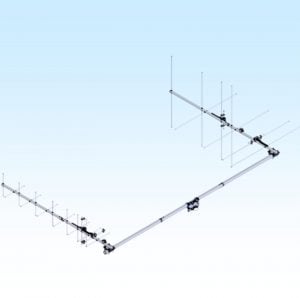
Purchase M2 LEO-Packs from the AMSAT Store.
When you purchase through AMSAT, a portion of the proceeds goes towards
Keeping Amateur Radio in Space.
https://amsat.org/product-category/hardware/
March/April 2025 AMSAT Journal Now Available
The March/April 2025 issue of The AMSAT Journal is now available to members on AMSAT’s Member Portal.
The AMSAT Journal is a bi-monthly digital magazine for amateur radio in space enthusiasts, published by the Radio Amateur Satellite Corporation (AMSAT). Each issue is your source for hardware and software projects, technical tips, STEM initiatives, operational activities, and news from around the world.
Inside the Current Issue:
- Using AI to Keep Amateur Radio in Space – Joe Kornowski, KB6IGK
- New Space Opportunities
- The Future of Lunar Amateur Radio – JS1YMG Update
- APRS Update
- SDR Update
- AMSAT Field Day 2025 Rules – Bruce Paige, KK5DO
[ANS thanks AMSAT for the above information]
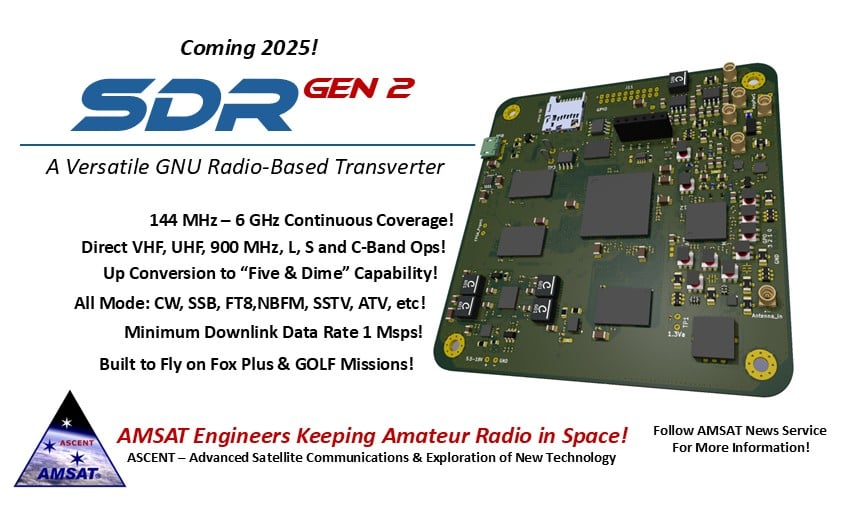
JAMSAT Symposium 2025: Satellites, Soldering, and Socials in Tokyo
The Japan Amateur Satellite Association (JAMSAT) successfully hosted its 17th annual general meeting and technical symposium on March 22–23, 2025, at the National Museum of Emerging Science and Innovation (Miraikan) in Tokyo. The two-day hybrid event welcomed both in-person and online participants and featured a diverse program of organizational updates, technical presentations, hands-on outreach activities, and social networking opportunities for the amateur satellite community.
The general meeting, held on the first day at noon, covered official business including approval of the 2024 fiscal report, auditor’s findings, the 2025 project plan, and a proposed revision to the association’s bylaws. JAMSAT members were invited to vote by proxy or attend via Zoom, and participation exceeded expectations. The event was formally recognized as an international meeting, qualifying for discounted use of the Miraikan venue and underscoring its educational and public-service role.
Immediately after the meeting, the two-day symposium began with a series of technical presentations. Topics included the RST (Lehman Satellite Tracker) by JI1SYC, a report on the ultra-compact RSP-03 “Hamorun” satellite, and a briefing on QO-100 operations from Cambodia under the XU7AMO callsign. Other featured talks explored a geostationary payload proposal by AMSAT-DL, the SHF beacon’s status, and technical insights into the Ten-Koh 2 receiver system for 5.8 GHz.
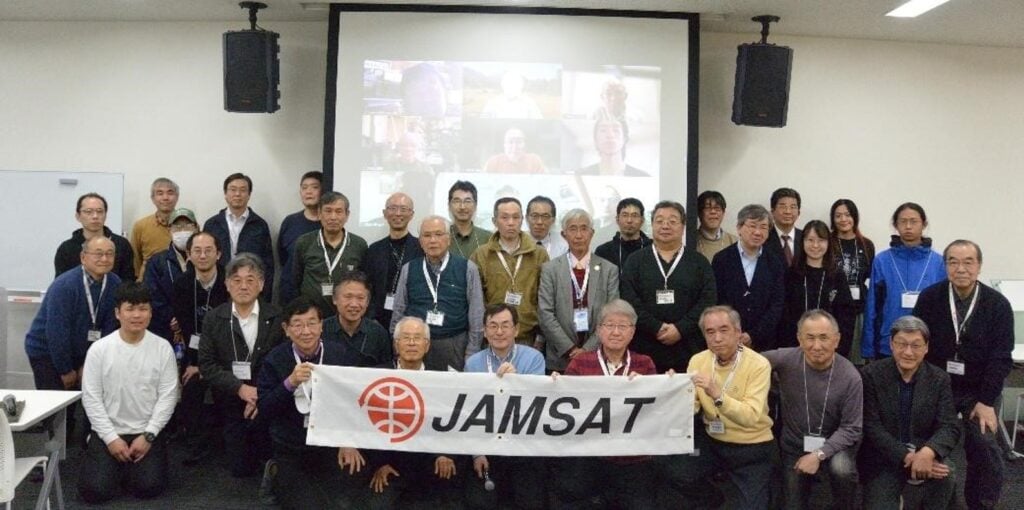
The 2025 JAMSAT General Meeting and Symposium was held in Tokyo and featured two days of satellite presentations. [Credit: JAMSAT]
Satellite mission updates were also prominent. Researchers from Chiba Institute of Technology presented results from the SAKURA satellite and previewed its successor, BOTAN. The team from Tokyo Institute of Technology introduced OrigamiSat-2, a CubeSat designed to test a two-layer deployable membrane antenna and high-speed downlink. The final session discussed amateur satellite roles in emergency communications, drawing attention to disaster readiness as a future focus area.
Public outreach remained a strong component of the event. On the morning of March 22, JAMSAT organized the “Touching Satellites” program with support from Icom Inc., offering live satellite demonstrations and electronics workshops for children. An exhibit area featured satellite engineering models and educational posters, while 10 young participants had the opportunity to assemble and solder simple kits under the guidance of volunteers.
A formal dinner was held at the nearby Chinese restaurant Tōen in Telecom Center, drawing a wide cross-section of members for informal conversation and project discussion. The social gathering reflected a return to normalcy following years of pandemic-related restrictions and helped to strengthen the group’s community bonds. JAMSAT plans to publish digital versions of the symposium materials online and encourages continued member engagement through web meetings, field activities, and international coordination.
[ANS thanks the Mikio Mori, JA3GEP, JAMSAT Newsletter Editor for the above information]
Want to fly the colors on your own grid expedition?
Get your AMSAT car flag and other neat stuff from our Zazzle store!
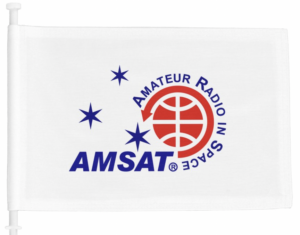
25% of the purchase price of each product goes towards
Keeping Amateur Radio in Space
https://www.zazzle.com/amsat_gear
Changes to AMSAT-NA TLE Distribution for May 16
Two Line Elements or TLEs, often referred to as Keplerian elements or keps in the amateur community, are the inputs to the SGP4 standard mathematical model of spacecraft orbits used by most amateur tracking programs. Weekly updates are completely adequate for most amateur satellites. TLE bulletin files are updated daily in the first hour of the UTC day. New bulletin files will be posted immediately after reliable elements become available for new amateur satellites. More information may be found at https://www.amsat.org/keplerian-elements-resources/.
This week there are no additions or deletions to the AMSAT TLE distribution.
[ANS thanks Joe Fitzgerald, KM1P, AMSAT Orbital Elements Manager for the above information]
Change to Upcoming Satellite Operations
Due to the popularity of the https://hams.at website as a location to report rover activity, the AMSAT website will no longer attempt to track those reports separately. Thus, the AMSAT News Service will no longer carry routine coverage. Please make use of https://hams.at for information on upcoming satellite operations in the future.
[ANS thanks Ian Parsons, K5ZM, AMSAT rover page manager, for the above information]
ARISS NEWS
Amateurs and others around the world may listen in on contacts between amateurs operating in schools and allowing students to interact with astronauts and cosmonauts aboard the International Space Station. The downlink frequency on which to listen is 145.800 MHz worldwide.
RECENTLY COMPLETED
Astronomical society Kumova slama, Daruvar, Croatia, Direct via 9A1CCY
The ISS callsign was to be OR4ISS. The scheduled crewmember was Jonathan (Jonny) Kim, KJ5HKP
The ARISS mentor was SP3QFE
Contact was successful: Thu 2025-05-15 17:00:12 UTC 26 degrees maximum elevation
Congratulations to the Astronomical society Kumova slama students, Jonny, mentor SP3QFE, and ground station 9A1CCY!
UPCOMING
Amur State University, Blagoveshchensk, Russia, direct via TBD
The ISS callsign is presently scheduled to be RSØISS. The scheduled crewmember is Sergey Ryzhikov
The ARISS mentor is RV3DR
Contact is go for 2025-05-23 09:15 UTC
The crossband repeater continues to be active (145.990 MHz up {PL 67} & 437.800 MHz down). If any crewmember is so inclined, all they have to do is pick up the microphone, raise the volume up, and talk on the crossband repeater. So give a listen, you just never know.
The packet system is also active (145.825 MHz up & down).
As always, if there is an EVA, a docking, or an undocking; the ARISS radios are turned off as part of the safety protocol.
Note, all times are approximate. It is recommended that you do your own orbital prediction or start listening about 10 minutes before the listed time.
The latest information on the operation mode can be found at https://www.ariss.org/current-status-of-iss-stations.html
The latest list of frequencies in use can be found at https://www.ariss.org/contact-the-iss.html
[ANS thanks Charlie Sufana, AJ9N, one of the ARISS operation team mentors for the above information]
AMSAT Ambassador Activities
AMSAT Ambassadors provide presentations, demonstrate communicating through amateur satellites, and host information tables at club meetings, hamfests, conventions, maker faires, and other events.
June 21, 2025
Rochester Amateur Radio Association Hamfest 2025
Barnard Fire Field
410 Maiden Lane Rochester, NY 14616
KB2YSI
September 6, 2025
Greater Louisville Hamfest
Paroquet Springs Conference Centre
395 Paroquet Springs Drive
Shepherdsville, KY 40165
W4FCL
[ANS thanks Bo Lowrey, W4FCL, Director – AMSAT Ambassador Program, for the above information]
Satellite Shorts From All Over
+ Congratulations to Benni Riethmueller, DL4BEN, (age 16!) on receiving AMSAT Rover Award #087! To earn the AMSAT Rover Award, participants must accumulate a combined total of 25 points through various achievements in portable satellite operations outside their home grid square. The AMSAT Rover Award was established to recognize and honor the accomplishments of satellite operators who engage in rover operations. Rover operations involve the activation of grid squares outside one’s home grid, utilizing various satellite transponders and modes to establish communication links. A breakdown of the points system along with a list of past AMSAT Rover Award recipients can be found at https://www.amsat.org/amsat-rover-award/. Keep on roving, Benni, and continue to inspire others in the AMSAT community! (ANS thanks Bruce Paige, KK5DO, AMSAT Director of Contests and Awards for the above information)
+ China has granted scientists from six countries, including the United States, access to Moon rocks collected by its Chang’e-5 mission in 2020. Two NASA-funded U.S. institutions—Brown University and Stony Brook University—were selected to study the samples, despite longstanding restrictions on NASA’s direct collaboration with China. The China National Space Administration (CNSA) called the samples “a shared treasure for all humanity” and emphasized its commitment to international cooperation. Experts noted that while U.S.-China space technology exchanges remain limited, lunar sample analysis poses no military concern and aligns with global scientific norms. The Chang’e-5 samples are of particular interest because they appear to be about a billion years younger than those collected during the Apollo missions. CNSA officials stated they intend to maintain an active and open stance in global space collaboration through initiatives like the Belt and Road space information corridor. (ANS thanks BBC News for the above information)
+ The FAA granted environmental approval for up to 25 Starship launches a year at Starbase, a five-fold increase from the previous limit. (ANS thanks The Orbital Index for the above information.)
+ Due to budget cuts, NASA might scale back ISS operations, such as reducing crew size, extending crew missions, and halting upgrades to science instruments. A list of other NASA projects that may be abandoned by budget cuts is at https://www.planetary.org/articles/billions-wasted-mysteries-unsolved-the-missions-nasa-may-be-forced-to-abandon (ANS thanks The Planetary Society for the above information.)
+ Germany’s armed forces are planning to establish a large satellite constellation, aiming to create an independent communications infrastructure similar to SpaceX’s Starlink. The initiative, led by the Bundeswehr, envisions deploying hundreds of satellites to ensure secure and resilient military communications, with potential expansion into remote sensing and other applications. Germany has historically relied on satellite services provided by allies but shifting geopolitical dynamics have prompted a reevaluation of this dependence. The proposed Bundeswehr constellation is intended to ensure sovereignty and continuity in defense operations, even in contested or degraded environments. It would operate separately from IRIS2, the European Union’s own sovereign satellite project aimed at providing broadband internet across the continent. Read the full article at: https://www.space.com/space-exploration/satellites/germanys-military-wants-its-own-starlink-like-satellite-constellation
(ANS thanks the Andrew Jones, Space.com, for the above information.)
Join AMSAT today at https://launch.amsat.org/
In addition to regular membership, AMSAT offers membership to:
* Societies (a recognized group, clubs or organization).
* Primary and secondary school students are eligible for membership at one-half the standard yearly rate.
* Post-secondary school students enrolled in at least half time status shall be eligible for the student rate for a maximum of 6 post-secondary years in this status.
* Memberships are available for annual and lifetime terms.
Contact info [at] amsat.org for additional membership information.
73 and remember to help Keep Amateur Radio in Space!
This week’s ANS Editor, Mark Johns, KØJM
mjohns [at] amsat.org
ANS is a service of AMSAT, the Radio Amateur Satellite Corporation, 712 H Street NE, Suite 1653, Washington, DC 20002
